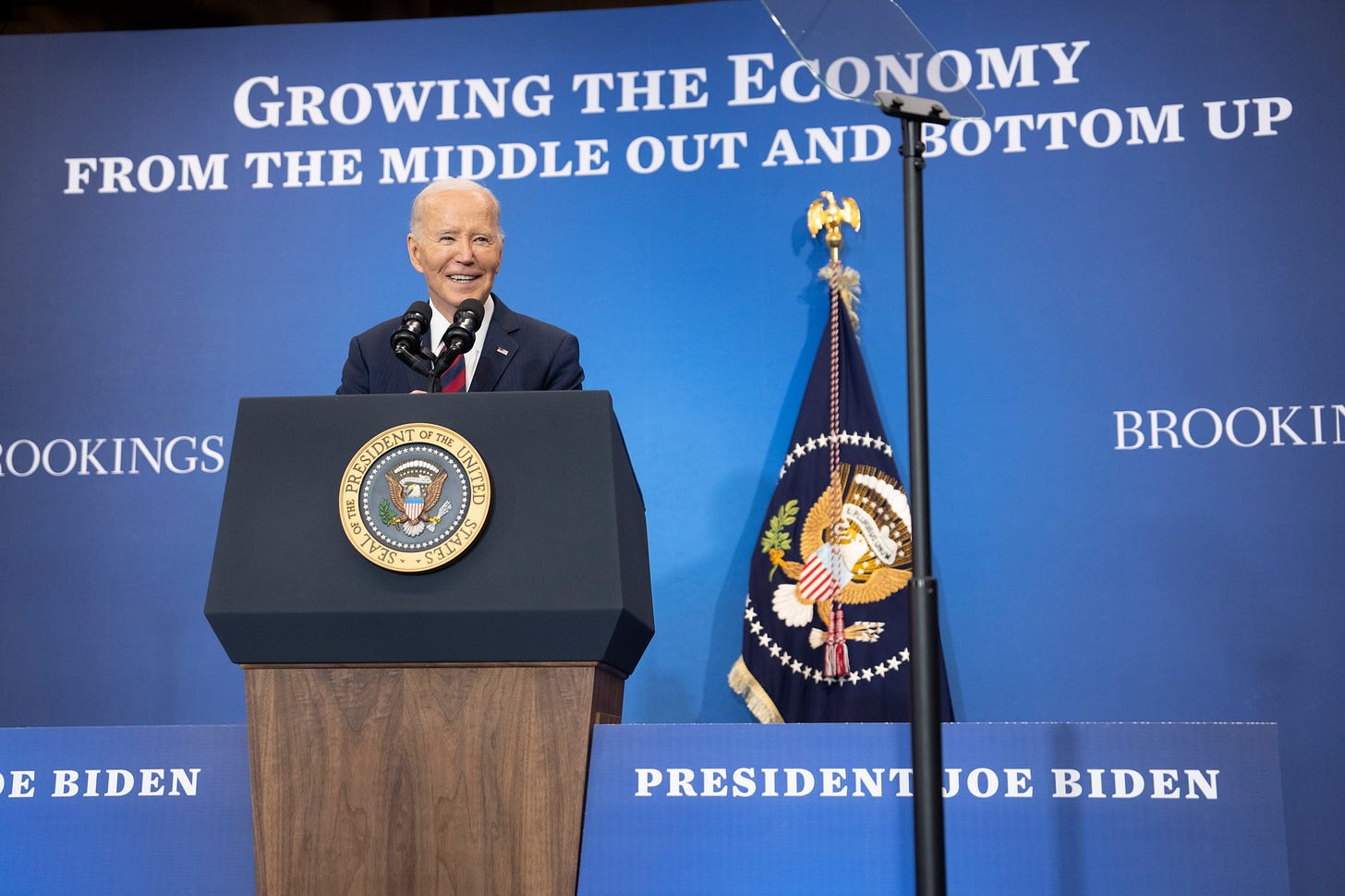President Biden delivered remarks emphasizing the accomplishments of his administration’s economic strategy, which focuses on fostering growth from the “middle out and bottom up.” He highlighted significant achievements, including creating 16 million new jobs—the most in any presidential term—and the lowest average unemployment rate in 50 years. Inflation has been brought down to pre-pandemic levels, while over $1 trillion in private-sector investments have fueled clean energy and advanced manufacturing projects. Biden credited these outcomes to his administration’s policies supporting unions, increasing wages, and creating high-paying jobs that don’t require college degrees.
Biden outlined key legislative achievements that have driven these results, including the American Rescue Plan, which provided pandemic relief, and the Infrastructure Investment and Jobs Act, which modernized the nation’s infrastructure. He also highlighted the CHIPS and Science Act, revitalizing domestic semiconductor manufacturing, and the Inflation Reduction Act, which focuses on clean energy investments, reducing prescription drug costs, and tackling climate change. The president emphasized his administration’s commitment to “Buy American” policies, prioritizing domestic production and job creation.
Biden acknowledged ongoing challenges, such as inflation and high living costs, particularly housing and groceries. However, he noted that decisive actions, like lowering prescription drug prices—capping insulin at $35 for seniors—and reducing hidden fees in banking, travel, and housing, have eased financial burdens for many Americans. Additionally, he emphasized his commitment to fair competition, which has empowered small businesses and spurred record numbers of new business applications, especially among Black, Hispanic, and women entrepreneurs.
Looking forward, Biden expressed hope that the next administration will continue to build on these accomplishments rather than revert to trickle-down economics, which he criticized for benefiting the wealthy at the expense of the middle class. He stressed the importance of bipartisan cooperation and unity in ensuring the nation’s economic progress. Concluding his remarks, Biden underscored the strength of the U.S. economy, calling it the “strongest in the world,” and appealed for continued investments in infrastructure, manufacturing, and clean energy to secure a prosperous future for all Americans.
President Biden's proclamation for Human Rights Day and Human Rights Week 2024 reaffirms the United States' dedication to upholding human rights at home and worldwide. He emphasizes the nation’s founding principle that all people are created equal and deserve to be treated with dignity. The proclamation commemorates the 76th anniversary of the Universal Declaration of Human Rights. It highlights the United States' ongoing commitment to defending fundamental freedoms like free expression, peaceful assembly, and fair elections while protecting civilians during crises and holding human rights violators accountable. This year also marks the 40th anniversary of the Convention Against Torture, a milestone in the global fight against cruel and inhumane treatment.
The proclamation details actions taken by the Biden Administration to advance human rights, including the establishment of the White House Gender Policy Council to promote gender equality, rejoining the UN Human Rights Council to address global human rights concerns, and working to protect the rights of LGBTQI+ individuals. The administration has prioritized equal access to opportunities for all, made investments in underserved communities, expanded accessibility for people with disabilities, and led efforts to prevent the misuse of technology that could enable human rights abuses. President Biden emphasizes the preservation of democracy as a central goal of his presidency, underscoring its role as the most effective tool for protecting human rights. Through initiatives such as the Summit for Democracy, his administration has worked to strengthen democratic institutions, fight corruption, and reject political violence.
The proclamation concludes with a call to action for the American people to honor Human Rights Day on December 10, 2024, and Human Rights Week through meaningful ceremonies and activities. President Biden envisions a future where shared values of dignity, freedom, and equality prevail, allowing everyone to live without fear and reach their full potential.
Vice President Harris emphasized the transformative impact of the CHIPS and Science Act on U.S. semiconductor manufacturing, highlighting its importance for innovation, economic growth, and national security. She announced that the Department of Commerce has finalized a $6.1 billion investment in Micron Technology, the only U.S.-based manufacturer of memory chips, to build state-of-the-art facilities in Clay, New York, and Boise, Idaho. This is part of Micron’s $125 billion long-term investment plan, expected to create at least 20,000 jobs by the end of the decade and increase the U.S. share of advanced memory manufacturing from nearly 0% to 10%. Additionally, the Department has agreed to preliminary terms for a $275 million expansion of Micron's Manassas, Virginia, facility, which will bolster critical technologies for the defense, automotive, and national security sectors.
Harris highlighted that Micron utilizes project labor agreements and apprenticeship programs to support local economies and ensure efficient, on-budget construction. She also noted that the administration’s bipartisan work to pass the CHIPS Act was driven by the need to address supply chain disruptions and semiconductor shortages, creating economic challenges. The investments are benefiting states across the political spectrum, demonstrating that innovation and economic progress are achievable through collaboration. Harris stressed that the CHIPS Act investments are vital for producing domestic chips for powering devices ranging from smartphones and vehicles to advanced defense systems and artificial intelligence infrastructure. These efforts, she concluded, will secure U.S. leadership in the 21st century while supporting American industries and workers, ensuring a lasting legacy of economic resilience and global competitiveness.
White House Press Secretary Karine Jean-Pierre held a press briefing highlighting President Biden's recent address on his economic legacy. The president emphasized his administration’s success in transitioning from "trickle-down economics" to a "middle-out, bottom-up" strategy. Achievements under this approach include creating over 60 million jobs, record-low unemployment, reduced inflation compared to other advanced economies, and a manufacturing and construction boom. Jared Bernstein, Chair of the Council of Economic Advisors, detailed benchmarks for the incoming administration to measure economic stewardship, stressing the importance of sustaining investments in infrastructure, clean energy, and semiconductors, backed by $1 trillion in private sector funding. Despite these accomplishments, the administration acknowledged lingering public pessimism attributed to inflation's residual effects and the rising cost of living.
The briefing also covered international support initiatives, including the disbursement of $20 billion to a World Bank fund for Ukraine, part of a $50 billion commitment leveraging frozen Russian sovereign assets. Additionally, the administration announced the first-ever White House conference on women’s health research, building on investments to close historical gaps in women's health studies. National Security Advisor Jake Sullivan is set to visit Israel to discuss hostages, Gaza ceasefires, and broader regional stability. The White House reiterated its commitment to locating journalist Austin Tice, offering a $1 million reward for information and working with international partners to secure his return. In Haiti, the administration condemned a recent massacre of nearly 200 people by gangs, calling for international assistance to restore security.
Domestically, the administration responded to ongoing issues such as unidentified drone sightings in New Jersey and California wildfires. While federal agencies are handling investigations into the drones, FEMA has issued grants to assist California in firefighting efforts. The press secretary also addressed concerns about violence in response to corporate greed, such as the United Healthcare incident, condemning all forms of violence while refraining from commenting on ongoing investigations.
President Biden expressed plans to remain active post-presidency, focusing on reducing polarization and division. The administration defended its efforts to protect public servants through executive actions, though questions arose about why legislative safeguards were not pursued. The briefing showcased various topics, from economic progress to international commitments, while reinforcing the administration's commitment to supporting the American people and addressing critical challenges.
President Biden delivers remarks emphasizing the accomplishments of his administration’s economic strategy





